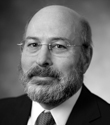
Faculty Comments on Anti-Angiogenesis in Gastric Cancer
In light of the AVAGAST trial data, do you expect that bevacizumab and newer-generation anti-angiogenic agents, such as ramucirumab, will play a significant role in the treatment of metastatic gastric cancer?
 |
Peter C Enzinger, MD |
| Assistant Professor of Medicine Harvard Medical School Clinical Director, Gastrointestinal Cancer Center Dana-Farber Cancer Institute Boston, Massachusetts |
My perception of the AVAGAST data was that a benefit was apparent for American and European patients. I would be interested in seeing a study that focused on those patients.
 |
Richard M Goldberg, MD |
| Visiting Professor of Medicine Physician-in-Chief, The James Cancer Hospital and Solove Research Institute Associate Director of Outreach Comprehensive Cancer Center The Ohio State University Medical Center Columbus, Ohio |
 |
Axel Grothey, MD |
| Professor of Oncology Department of Medical Oncology Mayo Clinic Rochester, Minnesota |
But they are running out of time if ramucirumab is being moved forward. So do I believe there is an opening for anti-VEGF inhibitors? Yes, I do believe there is an opening.
 |
Howard S Hochster, MD |
| Associate Director (Clinical Research) Yale Cancer Center Professor of Medicine, Yale School of Medicine New Haven, Connecticut |
 |
David H Ilson, MD, PhD |
| Professor of Medicine, Weill Cornell Medical College Attending Physician, Memorial Hospital Memorial Sloan-Kettering Cancer Center New York, New York |
 |
John L Marshall, MD |
| Chief, Hematology and Oncology Director, Ruesch Center for the Cure of GI Cancers Lombardi Comprehensive Cancer Center Georgetown University Washington, DC |
 |
David P Ryan, MD |
| Associate Chief of Hematology/Oncology Clinical Director of the Tucker Gosnell Center for Gastrointestinal Cancers Massachusetts General Hospital Boston, Massachusetts |
There were hints of promising results in the AVAGAST trial. I believe that future studies should not combine Asian gastric and GE junction cancers with Western gastric and GE junction cancers. I’m worried that there are 2 different biologies.
 |
Eric Van Cutsem, MD, PhD |
| Professor of Medicine Digestive Oncology University Hospital Gasthuisberg/Leuven Leuven, Belgium |
 |
Alan P Venook, MD |
| Professor of Clinical Medicine University of California, San Francisco San Francisco, California |
With regard to ramucirumab, this agent is currently being evaluated in clinical trials, but I don't know if we can distinguish these antibodies.